The cost to climb Kilimanjaro varies from $2,900 to $3,600, depending on the route. Prices include: guides, porters, tents, food, oxygen, park permits, taxes, and hotel accommodations.
Many people look for a cheap Kilimanjaro climb. But if you have done some research, then you have already found that this is not possible. And you probably have also discovered that there are a wide range of prices charged for climbing Mount Kilimanjaro by different outfitters, ranging from $2,000 to $7,000 per person.
What’s the difference between these Kilimanjaro guide services?
In this article, we will discuss what affects the cost of a Kilimanjaro expedition.
Kilimanjaro Prices Explained
The cost to climb Kilimanjaro depends on a few primary factors:
1. Group Size
The more people that are in a trekking party, the lower the cost per person. Climbs that have only one or two climbers will have the highest prices as the costs to operate are shared by a small number of people. Not surprisingly, climbs with a dozen or more people will have much lower prices.
Most companies, including Ultimate Kilimanjaro®, run open climbs where customers may book a spot to join to form a group.
2. Days on the Mountain
Each day spent on the mountain incurs additional costs in park fees, staff wages, food, and equipment use. Thus, longer routes are more expensive than shorter routes. Route selection also plays a part as some require more personnel, gear and logistical arrangements.
3. Level of Service
Kilimanjaro operators can be categorized into three price tiers: budget, midrange and luxury.
This is the main driver of the huge price disparity between different companies for what seems like the same service. The typical consumer has a hard time differentiating between operators because a company’s website doesn’t tell the whole story.
Ultimate Kilimanjaro® is a midrange operator offering high quality climbs at a reasonable cost.
We believe that luxury operators make you pay for things you don’t want and don’t need. On the other hand, budget operators cut corners in areas that are critical to your experience, including safety.
Below we will discuss the costs that go into organizing an expedition on Kilimanjaro, and why certain operators should be avoided.
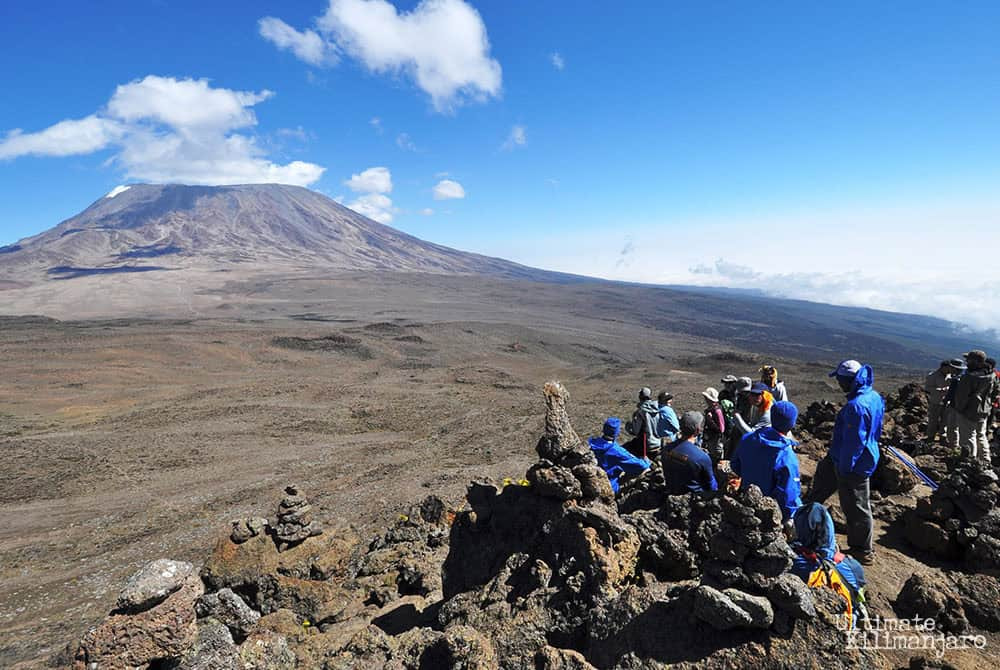
The Truth About Kilimanjaro Prices and Costs
There are more than 200 licensed operators on Mount Kilimanjaro.
The choices may be overwhelming. The bad news is that there are not many reputable operators, and who you choose to hike with is crucial to your success and overall experience. However, if you disregarded the questionable companies, you’d be left with only a couple dozen or so quality Kilimanjaro operators.
First and foremost, do not make your decision based on price alone. Price should be only one component of your overall decision. High altitude trekking is not the place to shop for a cheap “deal”, nor is it the place to overpay needlessly. What you are looking for is high quality service at a fair price.
We often are asked how we can be priced thousands of dollars less than the luxury operators.
To explain, we must look at the minimum expenses every Kilimanjaro operator faces, such as park fees and taxes, staff wages, food, equipment, transportation and other logistical costs. Kilimanjaro National Park entrance fees, camping/hut fees and Tanzanian taxes by far make up the biggest expense, costing about $200 per climber per day.
Below is a breakdown of climbing expenses:
Kilimanjaro Climbing Expenses
Conservation Fees – $70 per day per person.
Value-Added Tax – 18% of services
Wages, Food and Transportation Costs
After park fees and taxes, the other significant expenses are staff wages, food, and transportation costs.
Local wages amount to around $80-$150 per climber per day (depending on group size). Food costs come out to about $10-$20 per climber per day (includes food for staff). Transportation costs are about $100 per trip depending on the route. There are also costs associated with wear and tear on camping equipment and administrative costs for arranging your climb.
By adding up all the daily costs listed above, you can estimate what it may cost to fund a Kilimanjaro climb on your own. The total is certainly significant, but are not high enough to justify the jaw dropping price tags seen in the industry.
So instead of asking how we can be priced so low, you should be asking how those other companies can be priced so high?
Let’s take a look at the types of operators on Kilimanjaro.
Luxury Kilimanjaro Operators
Do not assume that a high cost operator is providing a superior climb for the money.

Do not assume high priced operators are better simply because they charge more. These operators pitch extraordinarily high success rates, greater safety standards and added luxury… and then they take advantage of you by charging exorbitant fees.
Do not be misled. It is mind boggling that some operators will charge $5,000, $6,000, even more than $7,000 per person for large parties on standard itineraries.
It does not cost that much to operate a climb on Kilimanjaro! There is absolutely zero justification for these kinds of prices and the premium you pay does not translate into a better experience. It goes directly to the luxury operator’s bank account.
The high priced operators are typically international companies that do not focus on Kilimanjaro. Some of them use foreign guides. But ask yourself, who knows the mountain better? A company that runs only a handful of climbs per year or a specialist like Ultimate Kilimanjaro® that operates more than 100 climbs per year?
Do you want to hike with a foreign guide who was flown in for a couple climbs per year, or a local guide who has encountered and handled various situations, with hundreds of clients, during his many years of service? Who can better assess the trail conditions, the weather, and their clients’ capabilities? Who is more in familiar with the route, more adapted to the altitude, and more in tune with the culture?
The luxuries provided by these operators can be silly. A walk in tent and full size sleeping cot – on a mountain expedition? A portable shower – at these low temperatures? Bottled water on the entire trek – instead of collecting and purifying water from nearby streams?
The high priced operators heavily market the added safety of using pulse oximeters, bottled oxygen and Gamow bags. Although pulse oximeters are a good indicator of altitude acclimatization, tests show that they are not completely reliable in the detection of altitude sickness and therefore should not be solely relied upon (Ultimate Kilimanjaro® uses pulse oximeters as a secondary measure to monitor climbers). Some “safe” operators supply “personal oxygen systems” to boost climbers, so they can climb higher – a truly dangerous practice. Nobody actually believes this is a good idea yet it does not stop some companies from pitching this “exclusive feature” to their clients (we carry bottled oxygen on every climb and use it responsibly – for rescue situations as a complement to descent). And the actual use of Gamow bags on the mountain is unheard of, because descent is the best, and always available, remedy.
Nonetheless, there are those who are more comfortable paying inflated prices to climb Kilimanjaro. For the most part, luxury operators do provide excellent service. However, we provide the same standards, including the same safety measures or better, and you don’t have to pay thousands more to have them!
General Tour Operators
General tour operators, by definition, are not experts on Mount Kilimanjaro.
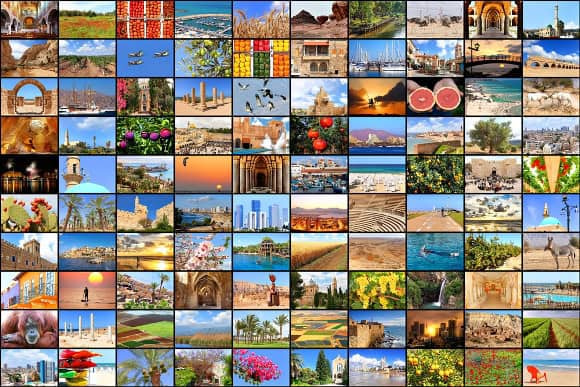
General tour operators are companies who book various types of trips for tourist destinations all over the world. These trips may include Kilimanjaro climbs and safaris, but they also include cruises, wine tasting tours, tropical getaways, scuba diving trips, etc. You get the idea. They sell everything.
Then, they contract local partners in each destination to handle the customers. Small general tour companies can have a handful of partners, while the largest ones can have several dozen partners.
So why is this bad? Because general tour operators are comprised of no one but sales staff.
They do not have a presence within the countries that their trips are run. Often times the staff does not have real knowledge of the trips themselves, as their primary job is to sell any trip the customer wants, no matter where it might be. So you are dealing with a salesperson who has never been to Kilimanjaro or has only rudimentary knowledge of hiking on Kilimanjaro.
The general tour company has no expertise on the mountain, and outsources to a local partner, whose operations may be good if you are lucky, or substandard if you are not. You may be put into a group with climbers booked by many different operators, or your trip may be unexpectedly canceled if it becomes unprofitable for the general tour operator or the local partner to proceed.
This is precisely what happened during the Covid pandemic. Many companies canceled all their climbs for the season regardless of whether the customers wanted to come or not, leaving many scrambling for other options.
At Ultimate Kilimanjaro®, we implemented new standard operating procedures and continued running trips throughout the year. Though some groups consisted of just one or two participants, we felt obligated to proceed. Rather than force clients to cancel and prevent our crews from earning income, we bore the financial burden of operating the climbs at a loss to the company. There are not many other Kilimanjaro operators who did this, if any.
Here is an testimonial we received from a client who had their trip canceled by another outfitter.
WHY YOU SHOULDN’T BOOK WITH GENERAL TOUR OPERATORS – A CLIENT’S SITUATION.
“Make sure your trips are guaranteed to run.”
 I was devastated. I spent all that money and time, and they left me scrambling to find a group elsewhere! Luckily, I found Ultimate Kilimanjaro and I was able to get onto a Lemosho group climb that fit my dates. Without your help I would have been stuck. But it all happened for the best I think. Your crew was just fabulous from beginning to end. Almost certainly I had a better trip with you than if I’d gone with the original company.
I was devastated. I spent all that money and time, and they left me scrambling to find a group elsewhere! Luckily, I found Ultimate Kilimanjaro and I was able to get onto a Lemosho group climb that fit my dates. Without your help I would have been stuck. But it all happened for the best I think. Your crew was just fabulous from beginning to end. Almost certainly I had a better trip with you than if I’d gone with the original company.
I wanted to say thank you to your wonderful staff and the Ultimate Kilimanjaro company for saving my trip. As you may recall, I had originally booked a climb and safari with [a general tour company] last October. I paid over $5,000 for my trip and $2,000 for my flights. Not to mention the money I spent renewing my passport, getting my visa, and buying all the equipment. I trained, got in great shape and was so excited to go. But then just two weeks before the trip, they cancelled my climb! They said not enough people were booked (I was the only one). Or I could pay another $600 to go by myself.
Candace W.
Joliet, IL
Ultimate Kilimanjaro® is a specialist outfitter dedicated to leading clients on Mount Kilimanjaro.
This is our passion and has been our only business for more than 18 years. All our staff have first hand knowledge having climbed Kilimanjaro themselves. All our trips are guaranteed to run regardless of the number of climbers booked.
We know climbing Kilimanjaro is a big investment for our clients, so we want to make your planning and preparation as easy and stress free as possible. We will never cancel your trip, or ask you to pay more money down the line.
Budget Kilimanjaro Operators
Avoid the cheap, low budget operators; they are downright dangerous.
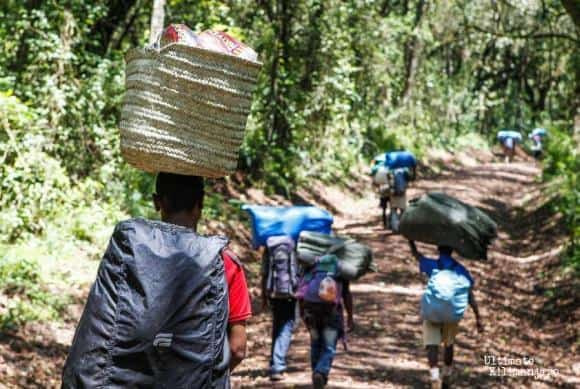
These are the worst companies of the bunch.
Local Tanzanian companies are primarily made up of low budget operators. Because these are often unestablished, desperate, poorly run companies, they use low prices as their only way to attract clients.
Their practice of undercutting each other has resulted in dangerous situations on the mountain. By reducing prices too far, there is simply no way for these operators to provide satisfactory services without skimping on necessary expenditures. It’s a certainty that they cannot meet the requirements for a decent climb.
Low budget operators often do everything poorly.
Here are the main reasons why low budget operators are a bad idea:
- Inferior Guides. The most important factor in the safety and success of a Kilimanjaro expedition is the knowledge and skill of your guide. However, low budget operators often hire freelance guides with little experience, poor English language ability, and no medical training. The competence of a guide is not always obvious until a crisis emerges, but by then it is too late. Quality guides do not work for the low budget operators. And if you were a quality guide, you wouldn’t either. Quality guides do not wait around for clients to walk in, hoping for some work. Quality guides are hired full time by the top operators and are busy leading groups on scheduled climbs, week after week.
- Lack of Safety Measures. In addition to their guides being untrained for medical emergencies, the budget operator does not have any system in place for safe high altitude trekking. Budget operators do not have or know how to use equipment that can help detect altitude sickness, such as pulse oximeters. They do not implement the Lake Louise Scoring System. They do not carry bottled oxygen to revive someone whose oxygen saturation has dropped to dangerously low levels. They do not have portable stretchers to carry injured climbers off the mountain. Some climbers who booked with budget operators and then became ill on the mountain were very lucky that our teams were nearby to assist when their own guides could not.
- Shoddy Equipment. Low budget operators use barely functional equipment. Most commonly, this is apparent in the condition of the tents. They buy off brand tents that are not waterproof, not durable and not for four season use. They use sleeping bags and pads that are worn out and no longer capable of providing adequate warmth. They have ancient vehicles that break down or get stuck. They use mixed and matched equipment in various stages of disrepair, and will try to “get by” rather than replacing their outdated inventory. Quality operators use camping equipment from reputable manufacturers. They regularly replace their tents, sleeping bags, and other gear, and have well maintained vehicles.
- Bad Food. Low budget operators skimp on the quality of the food they bring on the mountain. As a result, their clients are served nutrient deficient meals that do an awful job of replenishing the energy of trekkers. While not so apparent on the early days of the trek, as the trip continues a poorly fed person gets weaker as the energy demands grow greater. Many times, the food is repetitive, unappetizing, and tasteless. Quality operators provide a variety of great tasting, hot meals that climbers are excited to consume.
- Inconsistent Service. Local budget operators are notorious for being unpredictable. Although your friend may have had a wonderful experience with them, you can just as easily have a nightmare. Why does this happen? These companies do not have any operating procedures in place, so how they handle your climb is anyone’s guess. The attitude and culture of the low budget operator is, “We’ll figure it out as we go.” Unfortunately, this is not the model for safe mountain expeditions. Quality operators have guidelines in place for every facet of the climb, resulting in consistency in the service they provide.
- Irresponsible Trekking. Because the guides and porters of low priced operators are untrained, they do not practice responsible trekking that conserves the environment. Often, the mountain crews of low budget operators are seen littering. Quality operators educate their staff on the importance of conservation. Quality operators practice Leave No Trace ethics so everyone can enjoy the mountain for years to come.
- Porter Mistreatment. When you climb with a budget operator, you are directly contributing to the exploitation of the poorest people on the mountain – the porters. There are NO low budget companies that abide by the wage recommendations set by the Tanzania Park Authority. Budget companies are able to offer low priced climbs because they do not pay their mountain crews an honest wage. Quality operators do not compromise the welfare of their staff in order to sell a climb. The best Kilimanjaro companies pay the highest wages and are members of the Kilimanjaro Porters Assistance Project (KPAP), an independent organization whose mission it is to protect porters from mistreatment on the mountain.
- Untrustworthy. Low budget companies are more likely to be run by desperate, dishonest or immoral people. We have seen our website plagiarized countless times. Our route maps, photos, content and even our testimonials have appeared on websites of low budget operators. There is a higher risk of falling victim to scams when dealing with budget operators. By requiring payments through bank wire rather than credit card, it is impossible to recover funds paid to Tanzanian companies. You can read the horror stories on travel forums of people who lost their money to a fraudulent budget company. Even on the mountain, clients are targeted for theft by their own outfitters, and some guides refuse to continue climbing unless additional payments are made. Quality operators earn an honest living through great service, not by cheating customers.
Every year, we help clients fix their broken plans that they made with cheap, low budget operators. It is heartbreaking.

DON’T be deceived. DON’T book with [budget operator].
Why You Should Care About Porter Abuse
Nobody likes to pay more than necessary to climb Kilimanjaro. But we implore you to do some research into the working conditions of porters before you decide to climb with a budget operator. You may unknowingly be rewarding a company’s unethical behavior and exploitation of others.
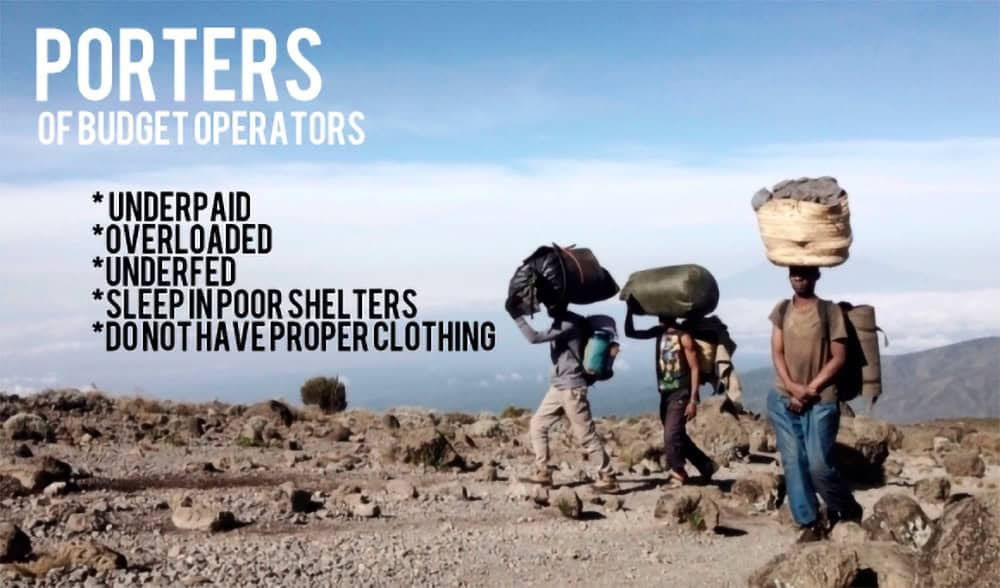
There is a fair share of budget operators who offer cheap climbs. But in return for that low price, these operators engage in appalling practices that are often out of sight to the tourist. These include:
- Paying porters less than minimum wage or not at all
- Allowing guides to take tips and wages meant for porters
- Feeding porters only once or twice a day
- Requiring porters to pay the operator a fee for food or camping on the mountain
- Forcing porters to carry loads greater than the weight limit
- Allowing porters to hike with insufficient clothing
- Not providing proper shelters for porters to sleep in
We hope that once you are aware of the issues surrounding porter mistreatment, you will only support Kilimanjaro operators that demonstrate their commitment to porter welfare. Only climb with KPAP member companies, like Ultimate Kilimanjaro®.
Please watch this nine minute video (made in 2008) that describes the plight of porters on Kilimanjaro.
KPAP partner companies, like Ultimate Kilimanjaro®, are leading the industry to improve working conditions for all porters on Mount Kilimanjaro.
Fighting for the fair treatment of porters is an uphill battle. There is strong resistance to change from certain local operators who have considerable power and influence over government and park regulations. In order to stop the abuse, tourists need to stop supporting the behavior, and boycott budget operators as a whole.
The Balance Between Price and Service
Providing high quality service is a choice.
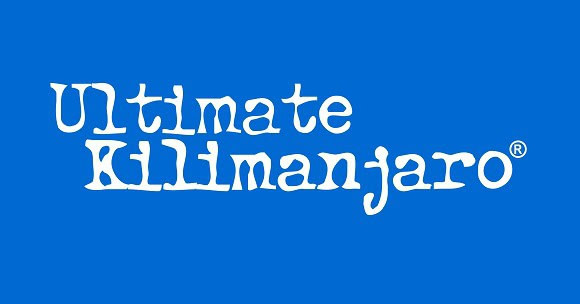
At Ultimate Kilimanjaro®, we do our best to exceed our customer’s expectations. We do so by employing the most well trained staff, providing quality equipment and food, and continuously developing/incorporating the industry’s best practices into our operations. We are diligent in ensuring your needs are met – on and off the mountain.
Professionalism and competence come at a cost, literally.
We understand how important it is to price our services so they are accessible for everyday people. Therefore we constantly re-evaluate our pricing to remain economically attractive in a highly competitive industry. This is how we have achieved success, becoming the #1 guide service on Mount Kilimanjaro.
Ultimate Kilimanjaro® offers high quality climbs at a reasonable cost. At our price levels, we can satisfy all park fees, pay real wages to staff, supply adequate food and proper equipment, while still providing great service to our clients. We are adventurers at heart, and therefore we strive to make climbing Kilimanjaro affordable. We don’t believe that doing something extraordinary should break the bank.


